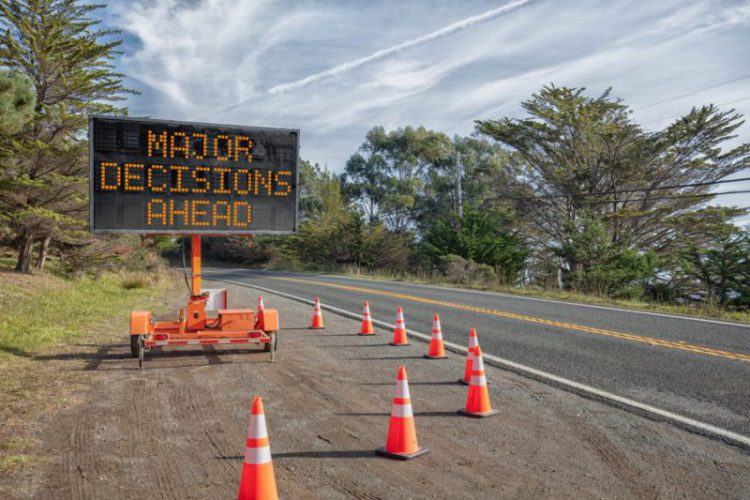
The government is considering changing the priorities drivers enjoy on the road. It wants to improve road safety by protecting vulnerable road users such as cyclists.
However, safety charity IAM RoadSmart surveyed drivers. This revealed drivers didn’t like the idea. Nearly three quarters (71 per cent) think giving more priority to cyclists and pedestrians over cars will cause more arguments.
IAM RoadSmart policy director Neil Greig claimed if the rules are changed, drivers need to be educated properly. He said: “The Department for Transport needs to be realistic about the impact simply changing a seldom-read document will have on the behaviour and safety of road users.” Take our quiz to find out how well you know the Highway Code.
Results
Well done, you certainly know your stuff when it comes to the Highway Code and road safety.
You could do with dusting off your Highway Code and brushing up on some of the rules of the road!
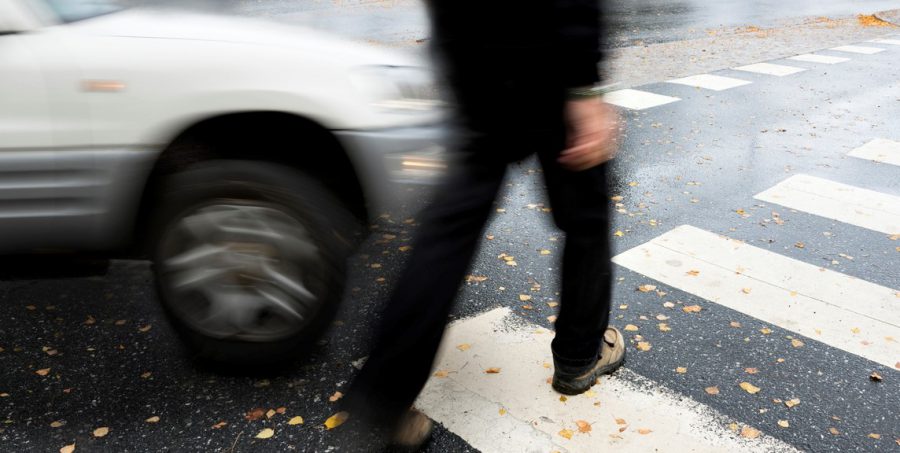
#1. A pedestrian starts to cross the road you’re turning into. Who has the right of way?
Highway Code Rule 170 states that if the pedestrian has started to cross, they have priority over the car driver.
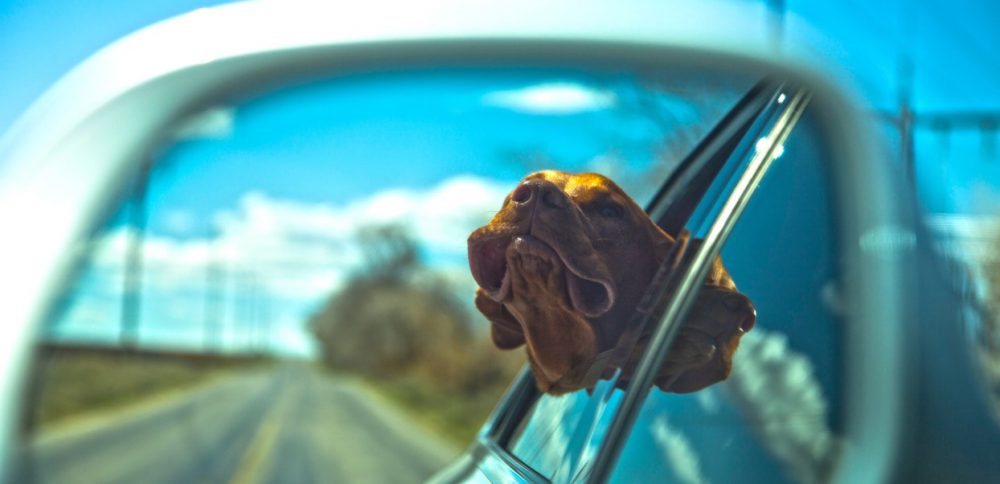
#2. Letting your dog hang its head out of the window is fine as long as…
Having an animal loose in the vehicle violates Highway Code rule 57 and can result in a potential maximum £5000 fine. If the animal causes an accident your insurer may not cover you either.
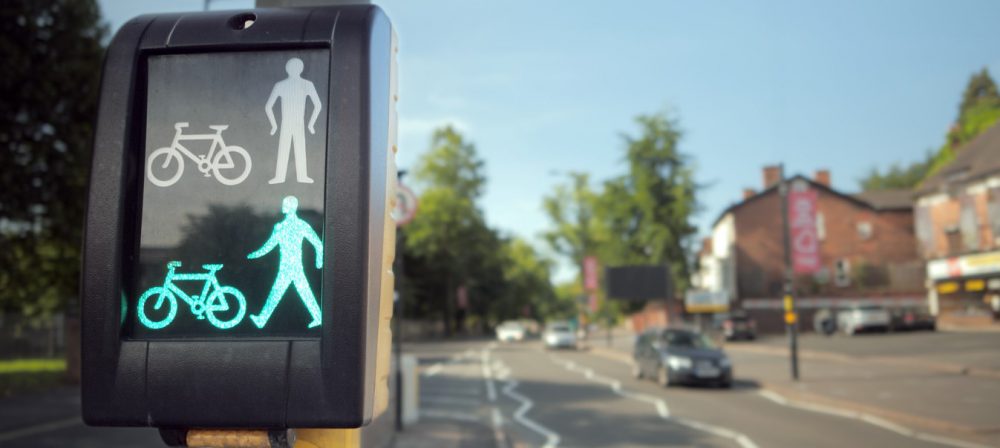
#3. Who is allowed to cross at a Toucan crossing?
A Pelican or Puffin crossing is for pedestrians only; a Pegasus crossing is for pedestrians, horse riders and cyclists; and a Toucan crossing is for pedestrians and cyclists.
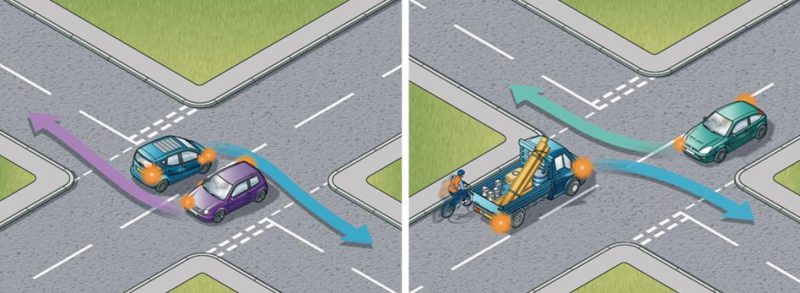
#4. When turning right at a crossroads you can turn across the front of a car from the opposite direction that’s also turning right (above right).
Rule 181 of the Highway Code says you can either turn in front or behind the other car. But it stresses that it’s safer to turn round the back of them as you have a clear view of any road users, such as cyclists, coming from the other direction.
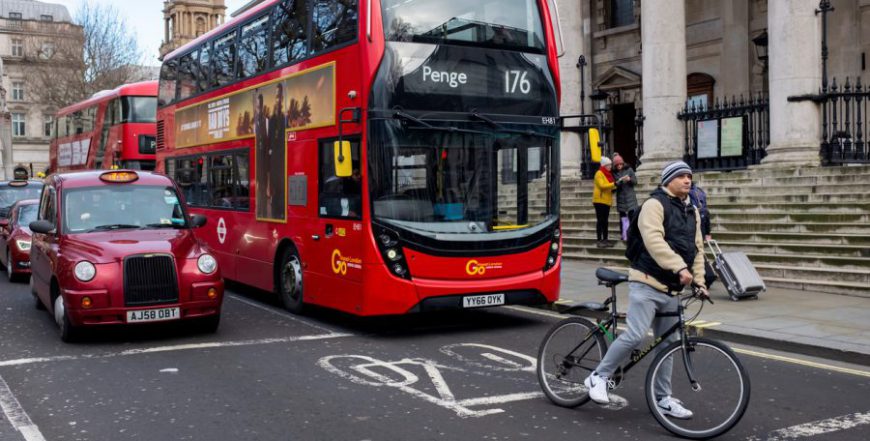
#5. You approach traffic lights with an advanced stop line and box for cyclists. When can you encroach on the box?
According to Highway Code Rule 178, you must stop at the first line and avoid encroaching on the box, if perhaps the junction is blocked. If the lights turn red while you’re crossing the box you may stop in the box and must do so before the second line.
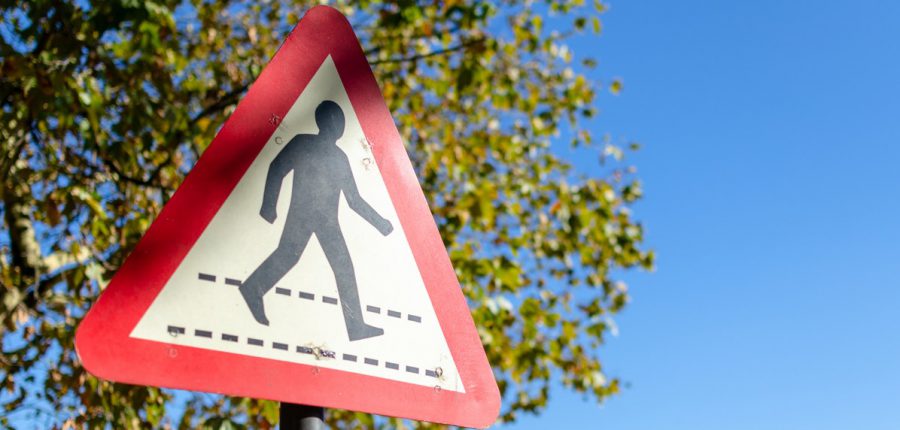
#6. What does this sign mean?
A red triangle is a warning sign. This one is warning that there’s a pedestrian crossing ahead.
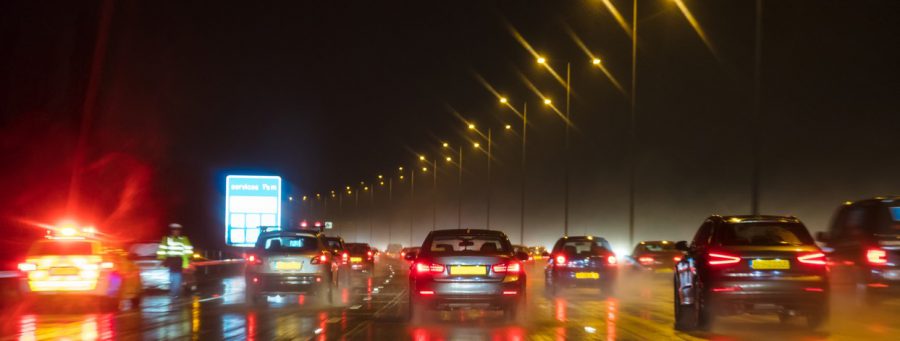
#7. How long does it take a car travelling at 70mph to come to a standstill?
If a car is travelling at 70mph drivers should allow 96m for it to come to a standstill. That’s approximately 24 car lengths.
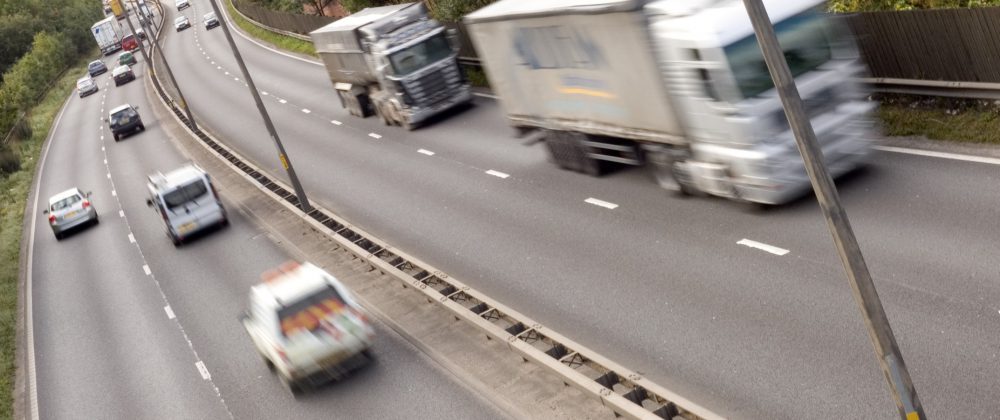
#8. When does the Highway Code say you may overtake on the left?
The only time you should overtake on the left (undertake) on UK roads is if the car on your right is turning right.
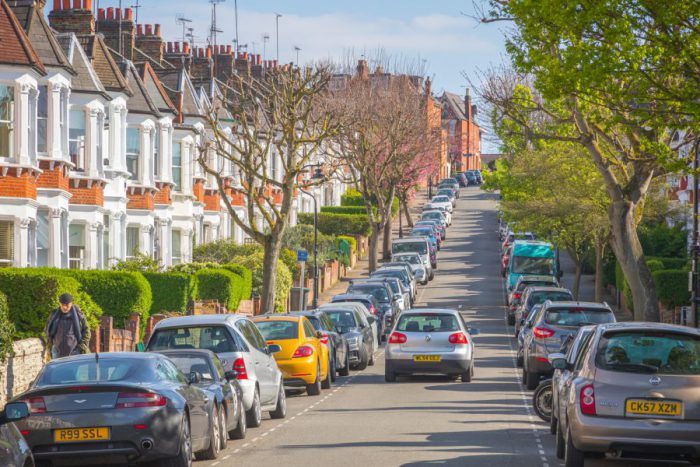
#9. You’re driving up a narrow hill and meet a car coming from the opposite direction. Who has to give way?
In Rule 155, the Highway Code states that the driver coming down the hill should give way to the driver coming up the hill. The thinking is the driver coming down hill has more control reversing up the hill than a driver reversing down the hill.
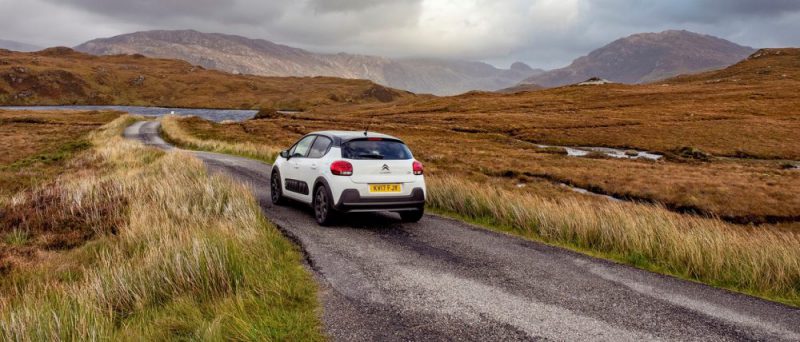
#10. You’re driving along a country road and come across a junction with no markings on it. Who has priority?
The answer is proceed with extreme caution. If there are no markings on the road, no one has priority.




Increased lines for cyclists already causing traffic congestion & long queues in Hull,& more pollution,
For no valid reason.
Not crushing cyclists seems quite a valid reason
Better cycling lanes and more separation from vehicles already increasing numbers of cyclists, reducing the volume of vehicle traffic, and improving air quality in our downtown.
Enjoyed that little highway code game
Rule 268
Do not overtake on the left or move to a lane on your left to overtake. In congested conditions, where adjacent lanes of traffic are moving at similar speeds, traffic in left-hand lanes may sometimes be moving faster than traffic to the right. In these conditions you may keep up with the traffic in your lane even if this means passing traffic in the lane to your right. Do not weave in and out of lanes to overtake.
The above suggest that the first option for question 8 could be considered to be correct, if badly worded. On many roads, it is not possible to overtake a car turning right as there is not enough room.
#1 If driver arrives first, pedestrian still has right of way!
#7 How many drivers can estimate 98m? 2 second rule far better.
In my area almost 1 million was spent on 3 miles of cycle track. Traffic suffered hold ups for a year, yet we still get cyclists riding on the road beside the track holding up traffic. That and the seeming, necessity of many riders to wear black at night, reduces tolerance for the innocent cycling community
Vehicle Excise Duty makes a massive contribution to government coffers – therefore those that pay it should have priority on the roads. Also as vehicles have greatly improved handling, breaking and safety features the rules should be adapted accordingly ( one will never account for idiots driving though )
Really useful exercise . Please make a regular feature
Re: Question #5. Highway Code Rule 178 states: –
Advanced stop lines. Some signal-controlled junctions have advanced stop lines to allow cycles to be positioned ahead of other traffic. Motorists, including motorcyclists, MUST stop at the first white line reached if the lights are amber or red and should avoid blocking the way or encroaching on the marked area at other times, e.g. if the junction ahead is blocked. If your vehicle has proceeded over the first white line at the time that the signal goes red, you MUST stop at the second white line, even if your vehicle is in the marked area. Allow cyclists time and space to move off when the green signal shows.
Laws RTA 1988 sect 36 & TSRGD regs 10, 36(1) & 43(2)
NOTE: …stop at first line reached if the lights are amber… In other words they should be treated the same as cross-hatched areas i.e. only enter if your exit is clear.
On question 4, surely this could be an possible mistake because.
1: I thought that was if there where road markings and a junction painted out for you.
2: if the drivers of both vehicles did this, surely the cyclists is in a vulnerable position and in a blind spot with the vehicle about to cross it’s path.
we need to think more of the safety of pedestrians and cyclists
Sire not working correctly- I answered 8 out of 10 correctly but was only scored 7?????
Me too???
not as well as I thought, it was 40 years ago I took my test so it proves refresher courses are needed maybe?
Stopped or slow traffic on right should never mean a total lockdown on clear ahead roads.
Why the question on speed/stopping ratio? I’ve never driven into the back of another vehicle, neither have I calculated my speed as opposed to clear road ahead. Read the road and adjust your speed accordingly.
Going to re-read Highway Code
good test.
I scored 10 out of 10, but my score said 6 and I needed to brush up on the Highway Code! Shirley
8/10 and the two I got wrong, well,! If I want to let a horse cross would it matter sorry but I always slow down and give horses priority, and at an unmarked junction if I want to give way to right why not we do at roundabouts it’s just common sense
I thought the advanced stop line and box for cyclists was to get them all together in a group in front of your vehicle so that you can run more over in one pass. No?
Priorities are down to economics v. social pressure. We have set the speed limit and current priorities such that we see 150,000 dead on the roads since 1975 as acceptable. We are content to accept the current level of deaths in exchange for the freedom to travel quickly and conveniently.
The conundrum as I see it is we allow our taxes to be spent on improved transport infrastructure and enjoy easier faster journeys for a few years. And the population is daft enough to think the new infrastructure is for them. But the industrialist say “Oh no my friends, it’s for me.” He then begins changing his industry to capitalise on the benefits of the new infrastructure. A typical ploy is to centralise the workplace and shut down satellite branches becasue the workforce can travel further and faster making it feasible for them to travel to the new centralised workplace.
Eventually people realise that jobs have been lost and everyone is travelling further and spending more time and money travelling than ever they did. An god forbid the system to break down; more commuters are stranded and they are further away from home than ever they where.
Disagree with Number 5. If you’ve managed to cross the white line just after the Lights turn red then it means you’ve driven into the box under a Steady Amber. Highway Code states that Steady Amber means “STOP” just like the Red one does. The given correct answer means you would have seen the Steady Amber as you approached the first white line and ignored it thereby breaking the Highway Code. In other words, if you obey the Highway Code, you should never enter the box!
The right hand illustration in question 4 shows how dangerous it is to cyclists in particular to allow turning right in front of an approaching vehicle also turning right. It should not be allowed except at junctions controlled by traffic lights
Compulsory retests for under 25s should be introduced and ear plugs handed out to us more mature drivers when following this driver age group.
It may be the answers stated in the Highway Code but sometimes a you need to use your intelligence
Hey, that was fun.
I had never heard of Pegasus or Toucan crossings so I have learned something but there is nothing here to say how I would identify those crossings
It used to be give way to traffic coming up the hill. Heavy lorries and buses are good examples.
I think asking someone to reverse uphill into a potential blind summit is wrong. I understand the reason for the rule but think that is a thought to ponder.
I don’t care if I gave the wrong answer to question 4, I have never turned right in front of other vehicles, except where there is a filter, or directional arrows painted on the road, the highway code is totally incorrect, plus it is dangerous, and holds up the traffic.
Seemed fair to me! 7/10 but my replies were more cautious than the correct answers. But I am rarely in a hurry, live in a rural area and am laid back and polite. Maybe all drivers should be more laid back and polite. After all, by rushing and being stressed you only gain a very few minutes even on a long journey.
I have no problem with giving more priority to pedestrians and cyclists. I have a problem with people not knowing the Highway Code. Why are pedestrians and cyclists not required to know it, too. Surely that would be the way to stop arguments and incidents. The Highway Code is a sensible codex of rules but too little known.
Very Good I got 8 out of 10
With regard to question 10 -country roads without markings at a junction, my thoughts are to err on the side of caution by treating the any unmarked junction as perhaps an “invisible” roundabout! You don’t know what the other driver’s thinking or attitude is. Advance with extreme caution and not to make assumptions.
A matter of consideration in this situation by giving way, saves filling in forms and trying to justify yourself to the authorities and possible hospital treatment for both parties!
I was pretty sure if all lanes on a motorway were congested if you were in lane one say and the traffic had moved in that lane it was o.k to move up thus overtaking on the inside
Rule 268
Do not overtake on the left or move to a lane on your left to overtake. In congested conditions, where adjacent lanes of traffic are moving at similar speeds, traffic in left-hand lanes may sometimes be moving faster than traffic to the right. In these conditions you may keep up with the traffic in your lane even if this means passing traffic in the lane to your right. Do not weave in and out of lanes to overtake.
Question #8 is a naughty one. It’s the way the first answer is worded. It doesn’t mention ‘queueing’
So on a motorway with traffic on the right going slowly or stopped you cant overtake? Much like the flashing of headlights change of meaning a few years back its not so much the drivers need to brush up on the Highway Code its the Highway Code needs to be more agile in its response to changing driving conditions and habits.
No doubt it’ll catch up with electric vehicles by mid century and advise on who has priority at the chargers…by which time cars will be hydrogen powered and not use these chargers…
Slow and bureaucratic guide for badly maintained and designed roads.
Flashing of headlights has never been anything else but “Hello I’m here”.
I have the same opinion as the person above, if the motorway is at virtual stand still, maybe road works etc. the inside lane may be moving as there way be cars exiting, threefore you have to undertake on the left, this could equaily apply to the middle lane, otherwise cars will all move into lefthand lane potential causing a serious problem.
The problem with the binary answer to q4 is that you can see that the cyclist in the right hand illustration is at risk from the car turning right, with the lorry obscuring their view. Instinctively, I could see that turning behind the car is safer so I was led to say False.
I was pleased to see that I got all ten right however academic knowledge is less important than putting them into practice when driving.
Why put them into practice nobody else does. Useful to pass test then irrelevant.
I did get the question correct about overtaking on the left, if a car is turning right, BUT on a motorway when 3 or 4 lanes are congested then everyone is overtaking on the left when the queue moves in front of you, unless you are in the very outside lane.
I believe that if traffic is congested on a motorway you are allowed to overtake on the left to keep traffic moving.
Also if approaching traffic lights correctly, because of the sequence, you should not be in position where you need to cross the advanced line,
If so you have broken the law by crossing at an amber light.
People talk about getting on cycles, what about those people who are disabled and cannot do either one or both.
There is no point in changing the highway code unless all road users will comply. As a driver in London I see everyday cyclists and e- scooters and skateboarders risking their lives in traffic and those of pedestrians on footpaths as they make their way and treat the roads as a personal playground. Hardly ever do I see a hand signal or even a look over a shoulder before a change in lane. They plough right through red lights a blind T-junctions seeming to forget that while we are on red it means traffic could be coming from beyond the blind spot.
No, sorry the only way to improve safety is to make it a legal requirement that all road users at least in large towns and cities must be licensed and of taken some sort of driving test, at least that way you can say for sure the person has had the dangers made known to them and how they can avoid them.
Also they should have 3rd party insurance at least. If anyone has driven along the embankment they will of seen many a cyclist exceed the speed limit and overtake and undertake cars and buses on the main highway. This despite the super cycle highway built for them and largely not used by anyone. If Those road users can surpass the speed limits that all motorists have to comply with they should have to comply with the same rules. Sorry about the rant but it gets me that all the burden of cost and change is laid squarely on the motorist when quite frankly, if we were not so aware and forgiving of these jokers in the first place there would be a lot more road accidents.
I was surprised to find you can turn right in front of another car opposite turning right. I answered no because I always go around the other car’s back. Seems dangerous otherwise.